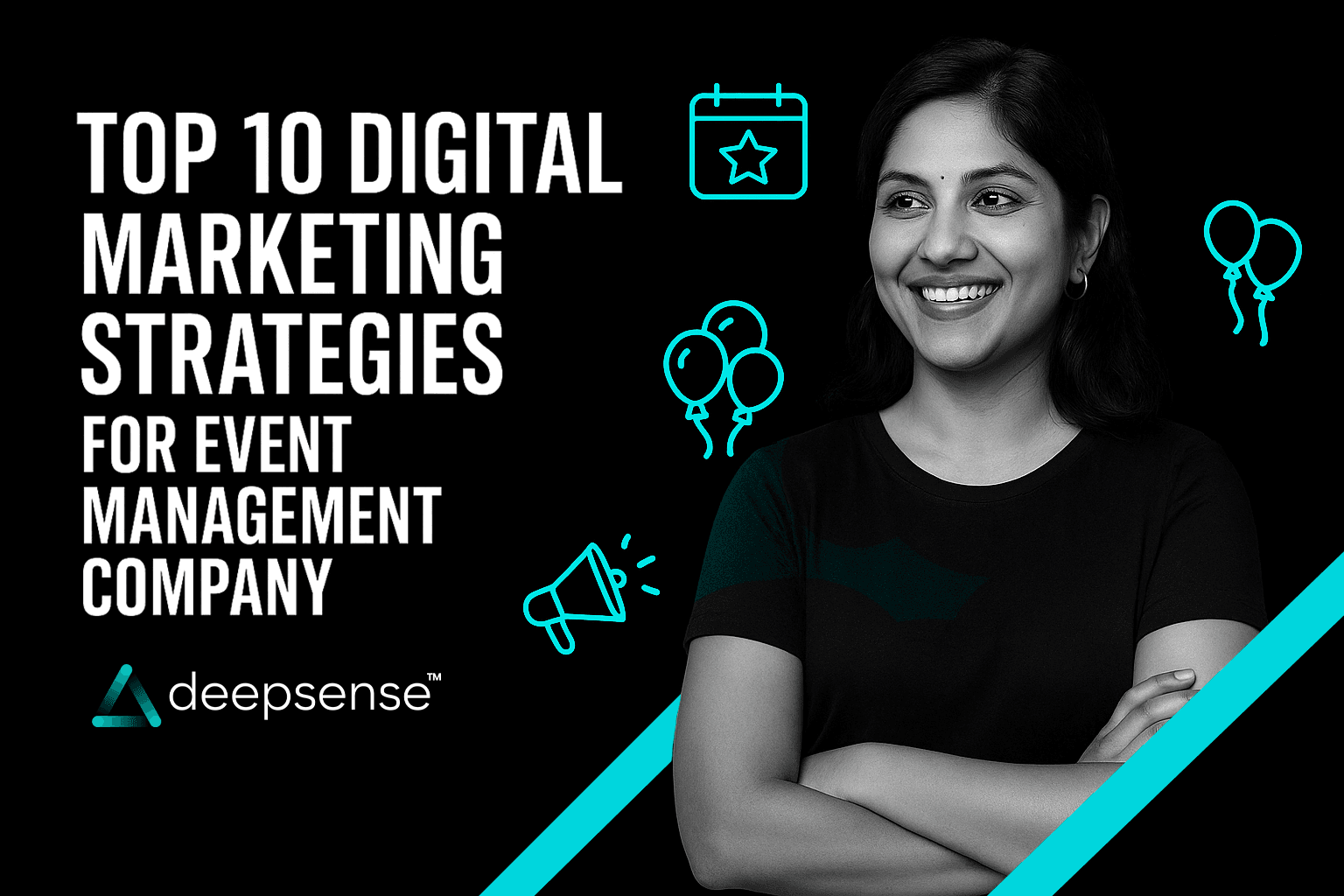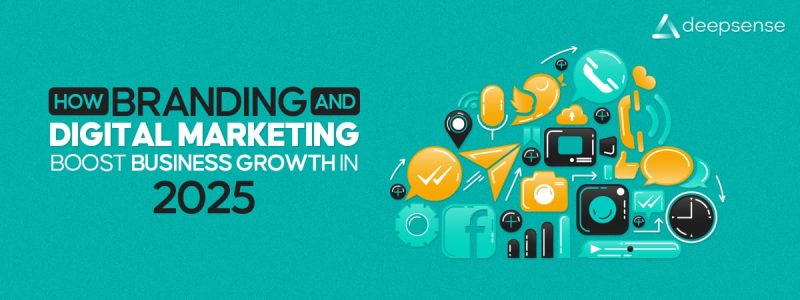In today’s hyper-connected world, the success of an event doesn’t just depend on what happens on the stage, but on what happens on the screen before, during, and after the show. For event management companies, digital marketing is no longer a bonus, it’s your main stage.
Whether you’re organizing weddings, corporate conferences, concerts, product launches, or intimate gatherings, the right digital marketing strategy can fill seats, attract sponsors, and make your event a talking point across social feeds.
So, let’s break down the top 10 digital marketing strategies that every event management company should leverage to create buzz, attract the right audience, and maximize ROI.
1. Search Engine Optimization (SEO): Help People Discover Your Events
Why it matters:
Most people Google everything, from “wedding planners near me” to “best event companies for brand launch.” If you’re not on the first page, you’re missing out on leads.
Actionable Tips:
- Optimize your site with keywords like “luxury wedding event planners in [City]” or “corporate event management company.”
- Build out landing pages for specific event services.
- Write SEO-friendly blogs like “Checklist for Planning a Dream Wedding” or “Top 5 Event Trends in 2025.”
Pro Insight:
Local SEO is crucial. Register and update your Google Business Profile, and get reviews to boost visibility.
2. Social Media Marketing: Your Digital Showroom
Why it matters:
Platforms like Instagram, Facebook, TikTok, and LinkedIn are perfect for showing what you do best: creating unforgettable experiences.
What to post:
- Reels of décor setups, time-lapses of stage building, and client testimonials
- BTS (Behind the Scenes) moments during event setups
- Countdown posts and speaker/guest reveals
Platform Focus:
- Instagram & TikTok – For aesthetic content and trends
- Facebook – For targeting local audiences & older demographics
- LinkedIn – For B2B and corporate event engagement
Stat to Know:
71% of consumers who had a good social media experience with a brand are likely to recommend it to others.
3. Content Marketing: Educate, Inspire, Convert
Why it matters:
Good content positions you as an expert in the industry, and builds trust.
What to create:
- Blogs: “Top 10 Wedding Themes for 2025” or “How to Choose the Right Event Venue”
- Guides: Downloadable eBooks like “The Ultimate Corporate Event Planning Checklist”
- Case Studies: Share the story behind successful events you’ve executed
Pro Tip:
Use storytelling. Don’t just say what you did, talk about the challenges, the vision, the transformation.
4. Email Marketing: Nurture Your Audience
Why it matters:
Email marketing helps you stay top of mind with past clients and prospects. It’s especially powerful for building long-term B2B relationships.
Tactics to try:
- Monthly newsletters with tips, trends, and event inspiration
- Email series for different audience types (e.g., wedding leads vs. corporate leads)
- Invitations and RSVP follow-ups
Stat to Note:
Email generates $42 for every $1 spent, one of the highest returns in digital marketing.
5. Pay-Per-Click (PPC) & Social Ads: Get Instant Visibility
Why it matters:
Need quick traction for an upcoming event? PPC and paid social ads are your go-to.
Where to run ads:
- Google Ads: “Event management company in [City]”
- Instagram/Facebook: Carousel ads, Stories, and video promotions
- LinkedIn: Great for reaching decision-makers for corporate events
Targeting Tips:
- Retarget visitors who checked your website but didn’t convert
- Use lookalike audiences based on past event attendees
6. Influencer & Partner Collaborations: Expand Your Reach
Why it matters:
People trust people. Working with influencers and event collaborators (like décor vendors, makeup artists, or caterers) can help you reach wider audiences.
How to use them:
- Co-branded content like “Here’s what went into creating this magical Sangeet night”
- Influencers sharing BTS moments or hosting giveaways for event invites
- Tagging partner vendors for cross-promotion
Pro Tip:
Focus on local micro-influencers with 10k–100k followers, they’re more relatable and engaged.
7. Video Marketing: Make People Feel the Experience
Why it matters:
Videos build emotion. A beautiful sizzle reel of your past events can be your best sales pitch.
Ideas for videos:
- Event highlight reels
- Time-lapse videos of setup-to-finish
- Client testimonial videos
- “What it took to build this wedding in 3 days” behind-the-scenes storytelling
Stat to Note:
88% of marketers say video gives them a positive ROI.
8. Website Optimization & Landing Pages
Why it matters:
Your website is your digital HQ. It needs to load fast, look stunning, and convert visitors into inquiries.
Must-haves:
- Clear navigation with event categories (Weddings, Corporate, Concerts)
- Portfolio gallery with videos and testimonials
- Strong call-to-action buttons (“Request a Quote,” “Book a Free Consultation”)
- Event-specific landing pages
Pro Insight:
Integrate a live chat or AI chatbot to answer quick questions 24/7.
9. Online Reputation & Review Management
Why it matters:
For events, trust and credibility are everything. Glowing reviews influence decisions more than any ad ever will.
Platforms to focus on:
- Google Reviews
- WeddingWire, WedMeGood, Eventbrite, JustDial
- Facebook & Instagram comments
What to do:
- Ask clients to leave reviews right after a successful event
- Respond politely to negative feedback to show professionalism
10. Marketing Automation & CRM Integration
Why it matters:
Managing leads across wedding seasons, festivals, and corporate quarters? Automation keeps your follow-ups timely and personalized.
Tools to try:
- HubSpot, Zoho CRM, or Mailchimp for event flows
- Automated email sequences: “Thank you for your inquiry,” “Let’s plan your dream event,” “Still deciding?”
Bonus Tip:
Tag leads by type (Wedding, B2B, Birthday, etc.) for tailored communication.
Real-World Example: How a Boutique Event Company Went Viral
Case Study: Lumière Events
A Chennai-based wedding planning company created a 15-second Reel of a bride walking down a petal-covered aisle in slow motion with the caption: “She said yes to forever—and to this aisle.”
What happened:
- 2.1M views in 4 days
- 10+ direct leads through DMs
- 3 venue collaborations offered for free
Takeaway:
Small moment + beautiful execution + emotional hook = viral gold.
In Conclusion
Event planning is emotional, personal, and visually driven, making it the perfect match for digital marketing. But don’t just market the event. Market the story. Market the transformation. Show people what it feels like to be part of something unforgettable.
With the right mix of creativity and strategy, your digital presence can help you:
- Attract the right clients
- Fill calendars with leads
- And turn each event into a marketing masterpiece
FAQs
1. Why is digital marketing important for event management companies?
Digital marketing helps event companies reach a wider audience, generate leads, showcase past events, build brand credibility, and stay competitive. In an industry driven by visuals and experiences, digital platforms are ideal for creating buzz before, during, and after an event.
2. Which digital marketing strategy works best for wedding planners or luxury events?
Visual platforms like Instagram Reels, Pinterest, and influencer marketing work best for wedding and luxury events. Pair this with SEO-optimized blogs and a high-converting website to attract and engage premium clients.
3. How can social media be used effectively for promoting events?
Use social media to post behind-the-scenes footage, highlight reels, event countdowns, and client testimonials. Engage audiences with polls, Q&As, and teaser videos. Paid ads can help target local or niche audiences as well.
4. What role does SEO play for an event management company?
SEO helps your website rank on Google for searches like “corporate event planners in [City]” or “top wedding planners near me.” This drives organic traffic, builds credibility, and brings in high-quality leads.
5. How can an event management company use email marketing?
Email marketing is great for sending event updates, seasonal offers, RSVPs, post-event thank-yous, and newsletters. Segment your audience (e.g., corporate vs. weddings) and personalize your messaging for better engagement.
6. What types of content should event planners create?
Event planners should create blogs, video case studies, client testimonials, Pinterest boards, Instagram Reels, and “how-to” guides. Focus on content that educates, inspires, and shows off your execution skills.
7. How much should an event company invest in digital marketing?
It depends on your business size and goals. A basic monthly budget can start from ₹25,000–₹50,000, while companies targeting high-end clients or large corporate events may invest ₹1L+ monthly across paid ads, content, and SEO.
8. Should I hire influencers to promote my events?
Yes, especially for lifestyle or luxury events. Influencers can help you build trust, reach niche audiences, and create viral content. Partner with local or industry-relevant micro-influencers for the best ROI.
9. What should a great event website include?
A well-optimized event site should have:
- Portfolio/gallery of past events
- Services and packages
- Client testimonials
- CTA buttons like “Request a Quote” or “Book a Consultation”
- SEO-friendly landing pages
- Mobile optimization and fast loading speeds
10. How can I measure the success of my digital marketing campaigns?
Track KPIs like:
- Website traffic and conversion rates
- Engagement on social media (likes, shares, comments)
- Ad performance (click-through rate, cost per lead)
- Lead form submissions
- Event attendance vs. registration numbers
Use tools like Google Analytics, Meta Ads Manager, and email marketing dashboards to monitor performance.











